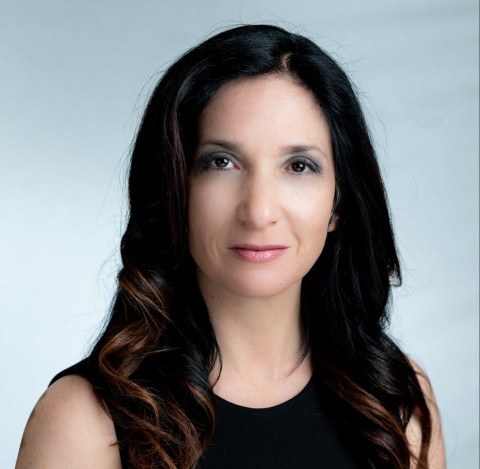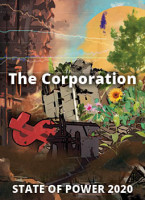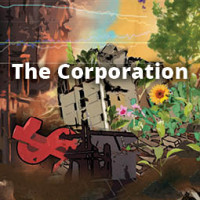Bonuses, bailouts and backroom deals Why banking corporations wield so much power
Temas
During her time on Wall Street, Nomi Prins grew increasingly aware of and discouraged by the unethical practices that permeated the banking industry. Read more about her experience within some leading international banks, and what she learned about the nature of the corporation.

Dean Zatkowsky
Nomi Prins worked in the upper echelons of the financial world as a managing director at Goldman Sachs and a senior managing director at Bear Stearns as well as a strategist at Lehman Brothers and an analyst at the Chase Manhattan Bank. During her time on Wall Street, she grew increasingly aware of and discouraged by the unethical practices that permeated the banking industry. In 2002, she left and has since become a journalist and writer and leading authority on financial and monetary systems. She is author of ‘Collusion: How Central Bankers Rigged the World’ as well as “All the Presidents’ Bankers: The Hidden Alliances that Drive American Power and ‘It Takes a Pillage: Behind the Bonuses, Bailouts, and Backroom Deals from Washington to Wall Street’.
From your experience within some leading international banks, what did you learn about the nature of the corporation?
The general theme is that all major multinational companies are driven by the bottom line. This means maximising profits and minimising costs. This might seem obvious but it permeates everything they do, the taxes they avoid, risks they take, and what they do in communities. I worked in four major international banks, and from the inside, upper management simply doesn’t care about how their activities impact the outside world.
For example, working at Bear Stearns in London in the 1990s, I was involved in a product that involved a major expansion of debt in emerging and corporate markets, looking at new ways to repackage and sell off or trade that debt, so that the bank could profit multiple times from a single bond. At the same time, activists with the Jubilee 2000 initiative, were campaigning on the streets, pointing to the dangers of these debts for needed investments in health, education and so on and looking to reduce the debt burden. But none of that mattered on a day to day basis within the banks anymore than current citizen demonstrations do, except in that they might move markets on any given day.
Corporations are also very much driven by short-term profit gain and how to translate favourable quarterly and annual results into higher share prices. In the banking sector, and most corporations, the higher up people are in the firm, the more likely they will receive part of their compensation in the form of shares, stocks, or options on an annual basis, so everyone cares most of all about what was made that year at the firm and how it impacted share prices. There may be internal meetings on five year-plans or products, but the whole of corporate culture is geared to those annual profits.
This shapes corporate culture, by increasing competition between departments and within departments with everyone wanting to get the most credit for what they are doing, so as to have it reflected in their year-end bonuses. I experienced this personally at Goldman Sachs in New York, where I was running a department expanding the credit derivatives market that would ultimately play a role in the financial crisis. I had worked on a successful deal with several internal groups made up of many pieces worth millions of dollars to the firm, and when I took the stairs to the next floor to let the head of the division, Lloyd Blankfein, know about my group’s role in the deal, I found a colleague from another department already there inside the office pretending it was their deal, so as to take credit for it. He ultimately rose to a very high level there.
So what does it mean now that corporations are increasingly saying that purpose rather than profit is their goal?
Well part of maximising profits for a corporation does also involve being tapped into the ether of outside. This week, for example, we have seen BlackRock, the largest asset manager in the world with assets worth more than the GDP of many countries, saying it will shift some of the money it manages into more environmentally-friendly investments. This is not necessarily because they or the CEO loves the environment. If that were solely the case, this decision could have been made years ago. It is because the company feels it can profit from the shift due to a groundswell of opinion on the outside that would make these more environmentally friendly investments more profitable as more investors note this opinion and popularity shift. This is where economics and the environment intersect.
So there may be CEOs with strong visions about society or the world, but caring first and foremost about bottom line and what will make money is their main concern. If both can happen, that’s great but the shift is generally driven by the necessity of profits.
Why do corporations have so much power?
They have money and position - and that money buys them access to people in power so they can always have a seat at the table with senators, presidents, foreign ministers from around the world and so forth. For many decades, that money-power, or corporate-political relationship has been the very fabric of industry and policy. Corporate and political leaders don’t just meet formally, but also informally, living in the same neighbourhoods such as the Hampton's [near New York], going on holiday in the same places, visiting the same clubs, having the same circle of friends.
The money also goes directly to politicians through fundraising dinners and other forms of funding for political campaigns or issues. Money and power intersect at the top of society’s food chain with the relationships between CEOs and political leaders, but also at lower levels, such as where lobbyists for example are constantly meeting with political aides, writing the policies - tax, regulatory, trade etc. - that bolster their power. I wrote about it in All the Presidents’ Bankers that showed the deep ties of bankers with politicians over the past century, from a corporate, family and individual perspective.
One good example is Jamie Dimon, now the current CEO of JPMorgan Chase. He was a ‘Class A’ director1 on the board of the NY Federal Reserve during the financial crisis so he was both partly responsible for the crisis and associated with the Fed, the US central bank, that provide a massive bailout avenue to his bank, and other banks. And Jamie Dimon has remained a leading banker through the past three political party changes at the top of US politics – from President George W. Bush to Barack Obama to Donald Trump – and has had relationships with all of them. His bank was one of the long list of corporations that Trump noted during the signing ceremony of Phase One of the US-China trade deal at the White House in January 2020. At the same time, Trump mentioned he’d be seeing Jaime Dimon the next day. JPMorgan Chase is also the firm managing Obama’s personal financial asset management funds. Dimon may or may not differ ideologically to Trump, but his ultimate goal is to reduce scrutiny and regulation in order to keep profits and share prices high, so he will maintain relationships with anyone in power.
Going back a century, the Morgan’s had relationships with a long line of presidents, as did the Rockefellers, who were also senior executives at the bank during part of that time. This longevity also gives them power with other corporations.
So how does the banking sector’s power differ to other sectors?
Well, the banking sector has had a particularly strategic position given its control over large swaths of money that puts them at the centre of power, for historical reasons and because of the role it plays in issuing and distributing debt (including state bonds), its role in financing corporations through loans, IPOs and distributing shares, even its role in helping fund wars and private parts of defence and large-scale infrastructure projects.
So while there has been a shift of power recently to the tech sector, due to their accumulation of data, their growing assets and their social and media reach, banks still play a pivotal role in shaping the world.
What impact does this concentration of corporate power have on communities and on democracy?
One of the things that happens through corporate consolidation, or in banking speak, mergers and acquisitions, is that smaller companies get gobbled up by the large ones. In the banking sector (as well as the energy and media sectors) globally, a massive consolidation has taken place. This consolidation trend has happened for decades, but was accelerated by the political response to the financial crisis. The US government responded by offering a bailout to banks and the Federal Reserve responded by reducing the cost of money (or interest rates) to zero through cutting rates and through a process called quantitative easing or QE.
QE and similar methods of reducing the cost of money were adopted by major central banks around the world. In total, nearly $22 billion worth of money was fabricated by the largest central banks (including the Bank of Japan, the European Central Bank, the Bank of England, and the People’s Bank of China) but none of that money went to benefit citizens or build social programs. Instead, it went to banks like JP Morgan Chase as free or cheap money to use as they wanted. One thing they did was to buy up mid-sized banks that in turn bought up small banks. This meant that local communities suddenly had branches of mega banks in their midst instead of their local ones, that no longer cared about them, and money that would have stayed within the community was sucked out of the community.
Of course as banks grow, they also grow their power and influence at all levels – from local to national to international.
Another example of how the power relationship between banks and governments played out can be seen in the housing sector. The financial crisis, of course, led to a huge loss of homes as people couldn’t pay back their high-interest sub-prime mortgages, which caused the foreclosure rate to rise tremendously. Yet rather than helping people refinance so they could keep their homes, the federal reserve provided cheap money to banks who didn't feel obligated to help their customers in a similar manner. Banks were given an ‘out’ of their financial stress from the crisis that they helped to create, and individuals weren’t. Even now as we face a second wave of foreclosures that can still be traced to the crisis, people are not able to cheaply refinance loans to keep their homes. Meanwhile banks are lending to other financial companies and private equity / real estate firms that can buy up those foreclosed homes.
What is the relationship of corporations to society? How do they wield power culturally?
I think that a lot of power and corporate relationships to society takes place in how news stories are picked up by mainstream media and social media. We hear less about how corporations are gaining more power and paying less in taxes and how this leads to less money for small businesses, or various projects such as providing clean water, responding to fires, environment, wage growth, or jobs. We currently have money sucked out of the system, where society is effectively subsidising companies that in turn circumvent and shape the system to their advantage to increase stock prices without providing additional value to society. And then the rest of society is left to pick up the tab, or lose benefits in the process.
Companies spend a lot of money on PR to impose their point of view on society, too. Nearly all major companies, for example have social programmes. At Goldman Sachs we had a charity day where workers had to sign up once a year for a particular social project. On one particular day, I went with a whole group to paint an old people’s home in Brooklyn. The program was great from a PR perspective, but Goldman Sachs probably got a tax write-off for the day worth more than investment of our time, The tax advantage that corporations get from the relationships they have to policy makers, could be better spent on social improvements than their own tax savings.
What have been the best techniques or strategies for confronting corporate power and impunity?
Raising awareness of how banks operate is important, because they are the cornerstone of financial and economic conditions. There have been campaigns to move money out of big banks, which is great but I think we need to go a step further by demonstrating how moving that money into new banks, sometimes online ones, with more social and environmental commitments is good personally and for society as a whole. This means that activists can both optimise their personal finances (by getting better interest rates on their savings which some of these banks can provide, or lower rates and more access to loans) and also support investments in societal and environmentally positive projects.
Another positive initiative has been the drive for a public bank in California. The activism drew on public banking models such as in Germany and North Dakota and was able to push an initiative on the voting ballots, amidst strong opposition from the major banks. And now, a public bank has a greenlight to go ahead. That wouldn’t have happened five years ago and it took a lot of dedicated work across many groups. I think the key is having a clear focus, and lobbying and advocating in local and state politics in a systematic strategic way to achieve change.
What do you think should be the future of the corporation?
In general, the sheer size of corporations has to be tackled again and effectively. The big companies are just too big. Reducing and limiting their size would be the most direct way to reduce corporations’ power, footprint, influence and money flows. We have monopoly rules on media, energy and banking, but they don’t seem in practice to work or be upheld. Large companies continue to get bigger and smaller companies either disappear or are unable to compete at the same level.
Another avenue would be to provide incentives and financing to encourage smaller and more specialised companies that are autonomous yet work together, or what I would call the gig-corporate economy. I know one company for example that has deliberately divided into three companies that are autonomous but collaborate. This is a more democratic way of restructuring corporations and could be the wave of the future.
Notes
1 Each of the 12 Reserve Banks in the US are run by a nine-member board of directors, divided into three classes—Class C, Class B, and Class A. Class A and B directors are elected by member banks, Class A to represent the banks and Class B to represent the public. Class C directors are appointed by the Board of Governors to represent the public. https://www.federalreserve.gov/aboutthefed/directors/about.htm


